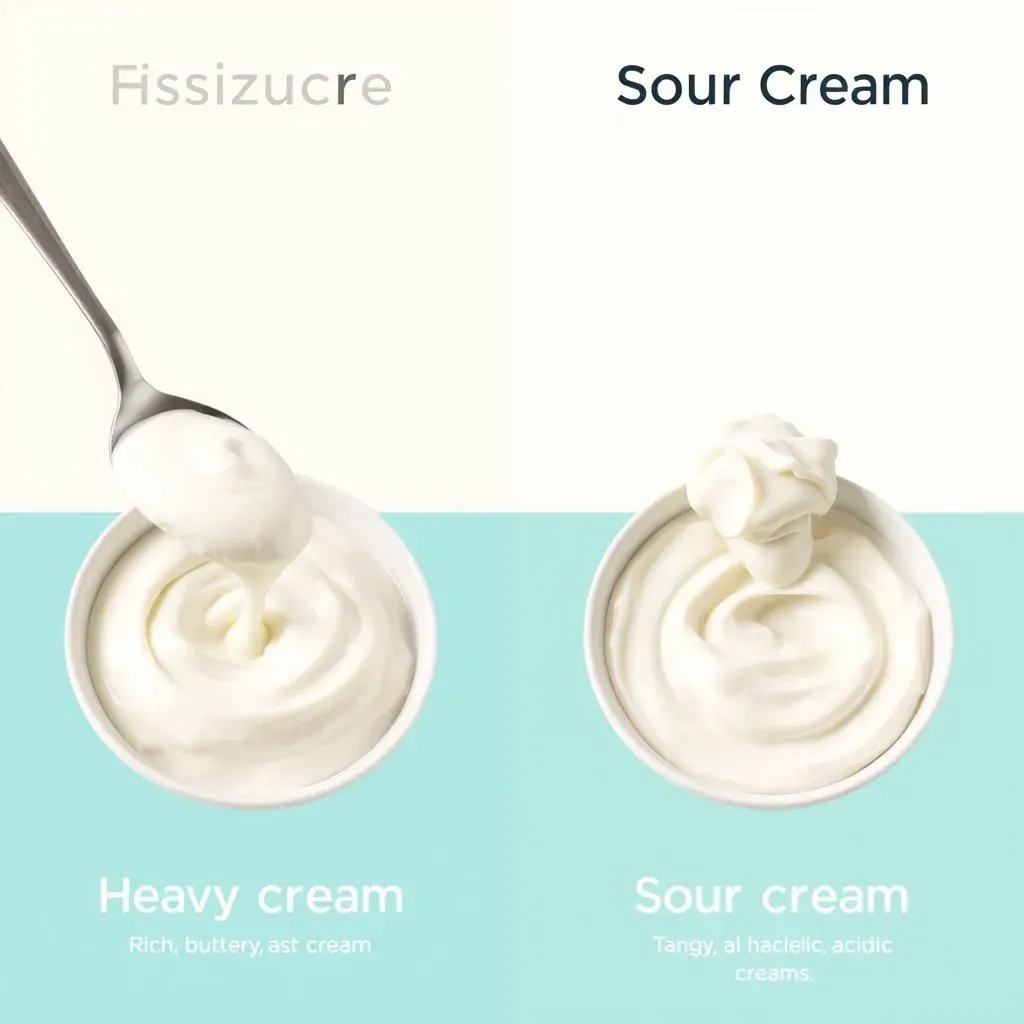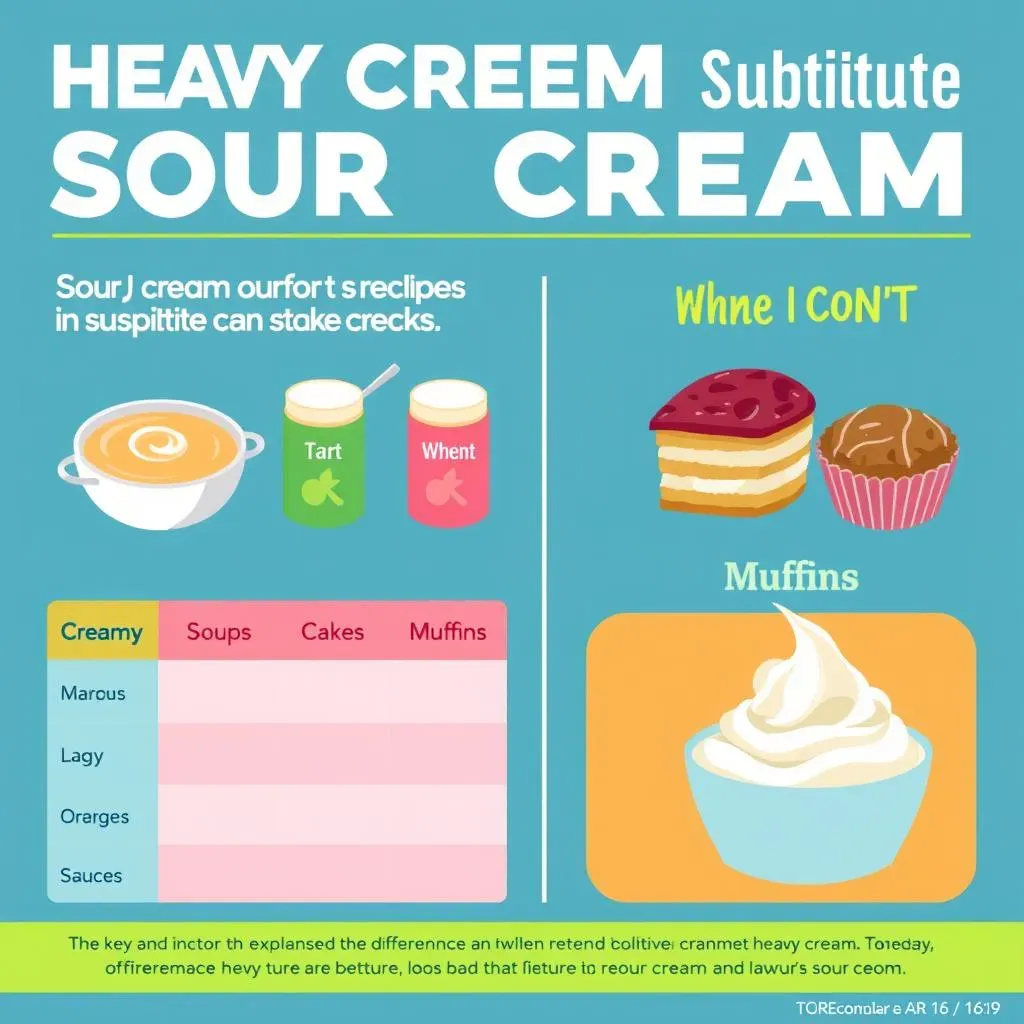Table of Contents
Ever stared blankly at a recipe, realizing you're missing a key ingredient – sour cream? Don't panic! We're tackling the burning question: can heavy cream substitute for sour cream? This isn't just about swapping ingredients; it's about understanding the subtle nuances of flavor and texture. This article will guide you through a delicious exploration of heavy cream and sour cream, comparing their characteristics and revealing when a substitution is a brilliant idea (and when it might lead to culinary disaster). We'll dive into the taste differences, explore how texture changes with the swap, and even provide examples of recipes where heavy cream works beautifully as a stand-in. So, whether you're a seasoned chef or a kitchen novice, get ready to unlock the secrets behind this creamy conundrum. Prepare to discover when you can confidently replace sour cream with heavy cream and when sticking to the original ingredient is the wiser choice. Let's get started and unravel the mystery surrounding this common cooking question: can heavy cream substitute for sour cream?
Can Heavy Cream Replace Sour Cream? A Taste Test

Can Heavy Cream Replace Sour Cream? A Taste Test
The Straightforward Swap: Does it Work?
Let's get one thing straight: heavy cream and sour cream are wildly different. Sour cream is tangy, a bit acidic, and thick. Heavy cream? Sweet, rich, and incredibly decadent. So, can you just swap them out willy-nilly? Sometimes, yes! But it depends heavily (pun intended!) on the recipe. In a dish where the sour cream is primarily for richness and creaminess, like a creamy soup or a potato casserole, heavy cream can often step in. However, if the tanginess of sour cream is a crucial element of the flavor profile, then you're in for a disappointment. Think of it like this: swapping heavy cream for sour cream in a dip is like trading a rich chocolate cake for a lemon tart – both delicious, but distinctly different.
For instance, if your recipe calls for sour cream in a savory dish like a chili or a stew, you might find that heavy cream adds a pleasant richness but lacks the signature tang. Consider using a combination of heavy cream and a touch of lemon juice or vinegar to mimic the sour cream's acidic bite. If you're unsure about the outcome, always start with a small substitution to test the waters. Need more ideas on sour cream alternatives? Check out our guide on using Greek yogurt as a substitute!
Ingredient | Taste | Texture |
|---|---|---|
Sour Cream | Tangy, slightly acidic | Thick, creamy |
Heavy Cream | Sweet, rich | Thick, but less tangy |
The Acid Test: Tangy vs. Sweet
The biggest difference between heavy cream and sour cream lies in their acidity. Sour cream gets its tang from the fermentation process, which creates lactic acid. This acidity is what gives sour cream its characteristic sharp flavor and helps it thicken. Heavy cream, on the other hand, is simply whipped cream with a higher fat content. It lacks the tangy kick of sour cream, resulting in a distinctly sweeter taste.
This difference in acidity is crucial when considering a substitution. In baked goods, where the acidity of sour cream can react with other ingredients to create a lighter, fluffier texture, using heavy cream can lead to a denser, less airy result. In some recipes, this might not be a problem, and the richness of the heavy cream could even enhance the final product. However, in recipes where the specific texture and tang of the sour cream are essential, you'll likely notice a significant difference. For example, consider using a cream cheese substitute instead for a similar texture without the tang.
- Acidity: Sour cream is tangy; heavy cream is not.
- Sweetness: Heavy cream is sweeter than sour cream.
- Texture: Both are thick, but sour cream is often slightly thicker.
Beyond the Basics: Considering the Recipe
Ultimately, the success of substituting heavy cream for sour cream hinges entirely on the specific recipe. In some cases, the swap might go unnoticed, resulting in a dish that’s just as delicious as the original. In other situations, the difference in taste and texture will be quite noticeable, potentially altering the overall flavor profile of your dish. Always consider the role of the sour cream in the recipe. Is it primarily for richness and creaminess, or is its tanginess a key element of the flavor?
For instance, in a creamy pasta sauce, the richness of heavy cream might be a welcome addition, while in a vinaigrette, the lack of acidity could be a deal-breaker. Before making the swap, carefully examine the recipe and consider the potential impact on the final product. If you're unsure, it's always best to err on the side of caution and stick to the original ingredient or explore other suitable substitutes. You might want to explore our guide on using buttermilk as a replacement for sour cream.
Heavy Cream vs. Sour Cream: Texture and Taste Differences

Heavy Cream vs. Sour Cream: Texture and Taste Differences
Texture Tango: Thick vs. Thicker
Let's talk texture. Both heavy cream and sour cream boast a lovely thickness, but there's a subtle difference. Sour cream, thanks to its fermentation process, often has a slightly more substantial, almost gluey consistency. Think of it as a plush, velvety cloud. Heavy cream, while thick, is more fluid, a bit silkier in its texture. Imagine the difference between a rich, creamy frosting and a dollop of super-thick yogurt. This difference in texture can significantly impact the final product. For instance, in a frosting, the thicker sour cream might hold its shape better, while in a sauce, the smoother heavy cream could result in a more elegant, less chunky consistency. Need a different thickener? Check out our guide on using cottage cheese!
The texture difference also affects how these ingredients behave in baking. Sour cream's thicker texture often contributes to a more tender crumb in cakes and muffins, while heavy cream can sometimes result in a slightly denser texture. The best way to figure out what works best for you is to experiment. Start with small substitutions and see what happens. You might be surprised by the results! Another great option to consider is buttermilk, which offers a unique tangy texture.
Ingredient | Texture Description | Baking Impact |
|---|---|---|
Sour Cream | Thick, almost gluey, velvety | Tender crumb |
Heavy Cream | Thick, but smoother, silkier | Potentially denser |
Tastebud Throwdown: Tangy vs. Sweet
Now, for the taste test! This is where the real difference shines. Sour cream's signature tang comes from the lactic acid produced during fermentation. It's a bright, sharp flavor that cuts through richness and adds a delightful zest to both sweet and savory dishes. Heavy cream, on the other hand, is all about richness and sweetness. Its flavor is smooth, buttery, and slightly sweet, making it perfect for adding decadence to desserts and creamy sauces.
Think of it like this: sour cream is the sassy friend who always adds a bit of spice, while heavy cream is the calm, comforting friend who brings the cozy vibes. This difference in taste is paramount when considering a substitution. In a dish where the tang of sour cream is crucial, like a dip or a dressing, heavy cream simply won't cut it. However, in a recipe where richness is paramount, such as a creamy pasta sauce or a decadent cheesecake, heavy cream might even elevate the dish beyond expectations. Consider using a cream cheese substitute for a milder taste.
- Sour Cream: Tangy, acidic, sharp
- Heavy Cream: Rich, buttery, slightly sweet
Recipes Where Heavy Cream Can Substitute for Sour Cream (and When It Can't)

Recipes Where Heavy Cream Can Substitute for Sour Cream (and When It Can't)
Creamy Soups and Sauces: A Match Made in Heaven
Let's start with the easy wins. In creamy soups and sauces, where the primary goal is richness and a luxurious mouthfeel, heavy cream often shines. Think creamy tomato soup, a decadent mushroom sauce, or even a velvety potato soup. The richness of heavy cream complements these dishes beautifully, enhancing their depth and flavor. You might not even miss the tang of sour cream; the overall creaminess often overshadows the difference. Need a lighter option? Check out our guide on using Greek yogurt for a similar effect!
However, remember that heavy cream lacks the acidity of sour cream. If your recipe relies on that tangy bite to balance the other flavors, heavy cream might leave the dish tasting slightly flat or overly rich. A simple fix? Add a squeeze of lemon juice or a splash of white wine vinegar to mimic the sour cream's acidity. Experimentation is key! Start with a small substitution, taste, and adjust accordingly. For a different tangy option, you could also try buttermilk as a substitute.
Recipe Type | Heavy Cream Works Well? | Considerations |
|---|---|---|
Creamy Tomato Soup | Yes | May need a touch of acidity |
Mushroom Sauce | Yes | Enhances richness |
Potato Soup | Yes | Consider adding herbs for extra flavor |
Baking Blues: When Heavy Cream Falls Short
Now, let's move onto the trickier territory: baking. In many baked goods, sour cream plays a vital role in providing moisture, tenderness, and even a slight tang. Its acidity can also react with baking soda or powder, creating a lighter, fluffier texture. Heavy cream, lacking that acidity, can result in a denser, less airy final product. Cakes and muffins, in particular, can suffer from a heavier texture when sour cream is replaced with heavy cream.
However, there are exceptions. In some recipes, particularly those that already call for a rich, dense texture, heavy cream might work surprisingly well. Think of rich brownies or dense pound cakes. The extra richness of heavy cream could even enhance the final product. But always proceed with caution and consider using a smaller amount of heavy cream than the recipe calls for sour cream, especially if you're concerned about the result. Want a different approach to baking? Check out our guide on using Greek yogurt in baking!
- Cakes: Heavy cream might result in a denser cake.
- Muffins: Similar to cakes, texture might be affected.
- Brownies: Heavy cream can enhance richness.